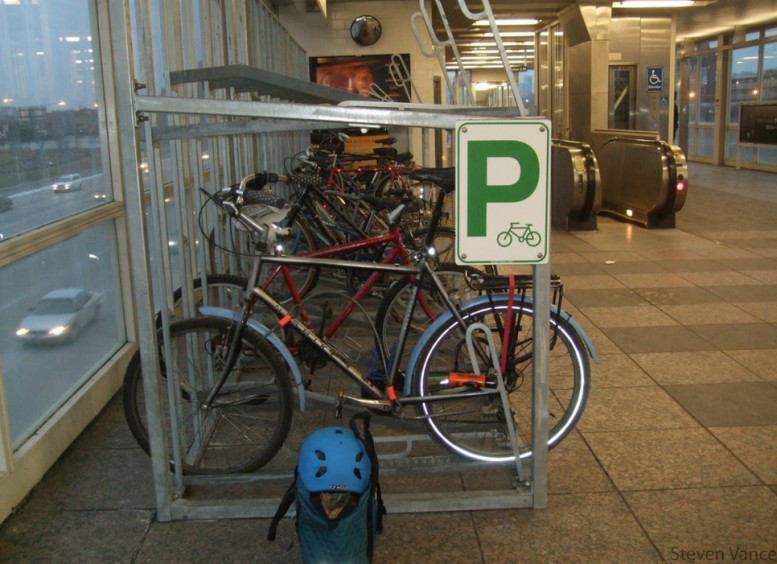The New Jersey Assembly’s Transportation and Independent Authorities Committee will consider five transportation-related bills this Monday, February 8. The bills cover a variety of issues, from pedestrian and bicyclist safety to the makeup of the New Jersey Transit Board of Directors.
A1348 (sponsored by Assemblywoman Grace Spencer) requires motorists operating vehicles to maintain a reasonable and safe distance when overtaking pedestrians and people on bicycles. New Jersey is the only state between Virginia and Maine to not have a safe passing law. Such a law seeks to ensure that motorists allow adequate space when passing people on bicycles to prevent sideswiping them or causing them to overcorrect to avoid a vehicle. This particular bill would extend the protection to pedestrians and other vulnerable road users. New Jersey has been called out for the lack of such law and continues to hold the state back from rising to the top of bike-friendly states rankings. While the bill passed the Assembly last session, it continues to stall in the Senate Transportation Committee.
A1461 (sponsored by Assemblywoman Pamela Lampitt) establishes the Pedestrian Safety Study Commission. This bill should be amended to mirror the more comprehensive S631 (sponsored by Senator Nia Gill), which would establish a Pedestrian and Bicycle Safety Advisory Committee. As more people choose to walk and bike, the way streets are designed must evolve to accommodate this shift in transportation priorities. This bill would bring together key stakeholders over a diverse area of expertise with this goal in mind. S2521 (also introduced by Sen. Gill) was pocket vetoed by Governor Christie last month.
A1919 (sponsored by Assemblyman John Wisniewski) would add two public voting members to the NJ Transit board. If passed, this bill would fill a void on NJ Transit’s Board of Directors by providing riders with a voice beyond simply public comments. While the current law says that at least one member of the board is required to be a regular transit rider, no current or past board member has ever been specifically designated this transit-riding member. Last year, the board voted unanimously in favor of the 9 percent fare hikes and service cuts despite overwhelming opposition from riders. The only dissent came from Ray Greaves, the board’s only non-voting member. The entire voting membership of the current NJ Transit board has gone 12 years without a dissenting vote on its record.
A227 (sponsored by Assemblyman Wayne DeAngelo) requires NJ Transit to hold public hearing and provide notice prior to any curtailment of certain bus and rail services. While riders knew about the 9 percent fare hike and accompanying service cuts, last September, NJ Transit delivered additional service cuts without any public notice, citing a current law did not require it.
A2205 (Assemblyman Tim Eustace) requires NJ Transit to provide locations at bus terminals and rail stations where bicycles may be safely secured.
Monday’s meeting of the Assembly Transportation Committee will take place at 10 a.m. in Committee Room 11 (4th Floor) at the State House Annex in Trenton.


It’s a shame that Bill A2205 even needed to be written. If NJ TRANSIT has been keeping abreast of current best practices, it would be doing this already and much more, just like 95% of all other large transit agencies.
The existing “reasonable and safe distance” language for overtaking cyclists is pretty much useless. No cop is going to enforce that unless there’s an actual collision (and even then it’s not likely). Extending that language to more people will not change much.
We really need to repeal the discriminatory “far to the right” regulation imposed on cyclists, so we can use a full lane and require motorists to change lanes to pass like they do for other road users.
Re: A227 – Public hearing requirements – There is a major flaw in this legislation. It states that any curtailment of service requires a public hearing; but does not define curtailment.
All transit agencies make adjustments in service to reflect changes in demand. This includes seasonal adjustments (more service in the Cape May area for the summer), less service on routes that have heavy student ridership for the summer, more service to shopping centers between Thansgiving and Christmas, and general frequency adjustments as needed. To require a hearing if bus or light rail service changed from every five minutes to every six minutes or because a factory generating riders cut its workforce in half and service was adjusted accordingly is ludicrous.
NJ Transit has had service adjustment guidelines for years. What apparently happened in the last go-around of service cuts is tha the railroad misinterpreted some of those guidelines and cut service that should have been included in the hearings without including those services.
But the real issue is funding. If there is no funding for all of the service that NJ Transit is operating, some of that service unfortunately has to be cut. And since the NJ Transit Board has no independent way to raise funds, the Legislature and the Governor need to take hard looks at themselves when service cuts are proposed and implemented.
Re: A2205 – Bike parking at stations 1. Where is the money to install and manage the bike parking? 2. If a municipality refuses to establish safe bike routes to the rail station or bus terminal, should bike parking be installed? Will NJ Transit be liable if a bike rider is hurt through no fault of NJ Transit on NJ Transit owned or operated property or on the way to/from such property? If NJ Transit operates the rail or bus station on a lease; but the owner does not want bike parking, what happens? If bike racks prove subject to theft, must NJ Transit install bike lockers?
Re: A1919 –
First, a correction. John McGoldrick, a long-time NJ Transit Board Member was the designated public transit user. I often saw him riding on the Northeast Corridor. He also was the liaison between the Board and the North and South Jersey Advisory Committees.
This leads to another point. NJ Transit can only operate within its budget. Therefore, if there is insufficient revenue (fares, state/federal aid, real estate leases, advertisements) to cover the cost of service, fares must rise and/or service must be cut. And that’s a reality, even if there are rail and bus commuters on the NJ Transit Board.
It would make more sense to me to reinvigorate the Advisory Committees by
1. Opening up their meetings to the public
2. Requiring agendas released in advance
3. Allowing sufficient time for public input.
4. Setting a term limit on members and making sure that a good percentage of members are active rail and bus users (though not necessarily daily commuters in order to get a range of viewpoints, including views on off-peak and weekend service.)
Many other transit agencies follow these guidelines for their advisory committees and most post agendas on line. Some even post videos of the Advisory Committee meetings on their web sites or on YouTube.
[…] week was a busy one for transportation advocates in Trenton. Tri-State, along with New Jersey Bike & Walk […]